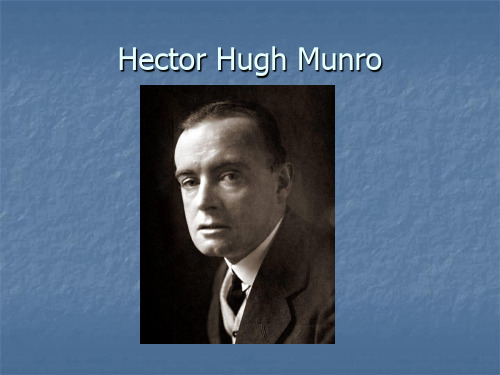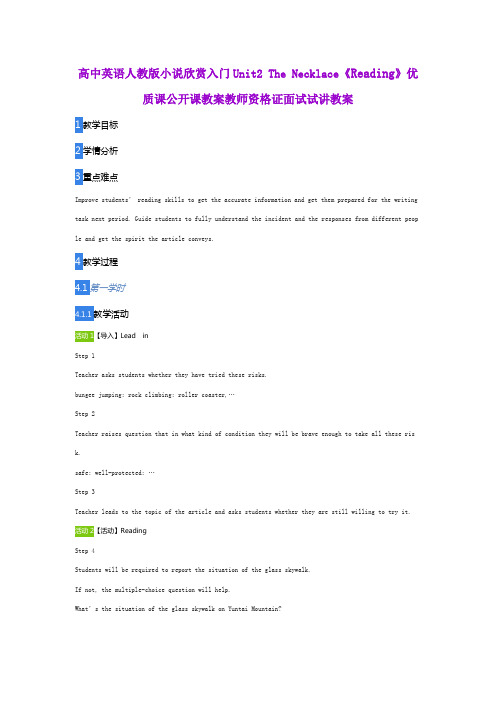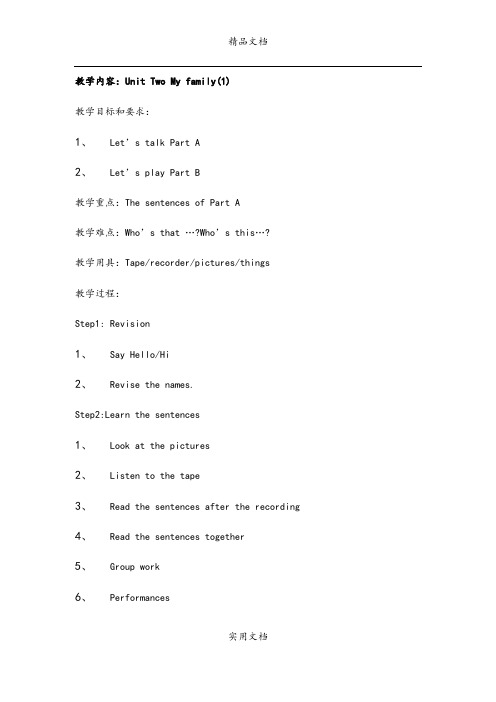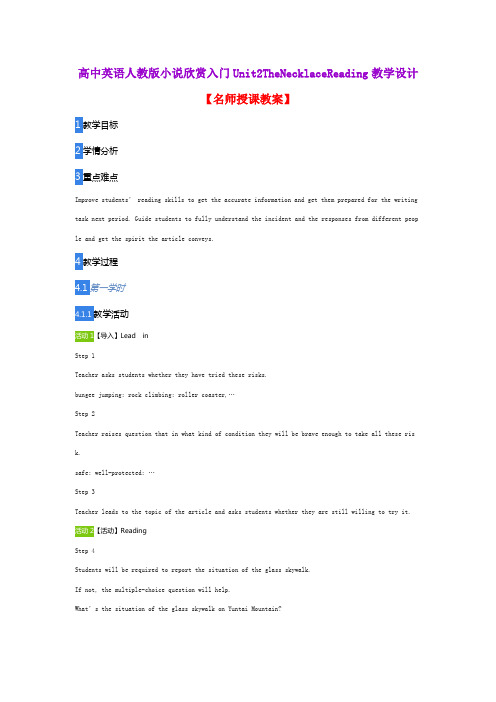英语短篇小说教程电子教案-Unit2
英文短篇小说阅读unit 2 text B

Question 1
Conradin is believed to have only five more years to live. What is significant about this detail?
Answer 1
Conradin is allocated to the category of the weak and the ill. Plus he is only ten years old, he is the object of oppression and control. The fact that his guardian accepts the doctor’s opinion readily doctor’ reflects her cruel and dominating nature.
Question 2
In the first two paragraphs how many times is Conradin’s imagination metioned? metioned? What can we learn about the relationship between the boy and his guardian?
Question 5
Read the descriptions below and find out all the words with religious connotations. In which sense is Conradin’s religion a parody of his cousin’s religion for example?
3) …from the realm of his imagination she was locked out-an unclean thing, which should find no entrance.
英语专业英语短篇小说-教案和课后答案

Keys to Unit OneLangston Hughes: Early AutumnTeaching objectives: 1.To learn the elements of fiction/short story2. Text for Reading3. Interpretation and DiscussionDifficulties: 1. To find the meaning under the surface of the words2. To write a short story after readingTime: 4 periodsTeaching procedures:1.the Introduction of the textbook as well as the teaching aims2.the elements of fiction/short storyFiction: the word fiction is a rather general term that can be define d as narrative told in prose. Therefore, fiction refers to different ty pes of writing such as folktale, myth, legend, etc., but it is most o ften associated with the novel and the short story.Short story: the short story is necessarily limited in length and scop e.Key words of short story: a single incident; a single character or a few characters; compact; creative and imaginative3. Exercises and analysis:1)Opinions of Understanding:(1) What was probably untrue of Mary?A. She missed the days of the past.B. She still loved Bill.C. She worked to keep a family of three children.D. She was satisfied with her life and job in New York.(2) Which of the following adjectives can probably best describe Bill’s attitude?A. Emotional.B. Indifferent.C. Puzzled.D. Hopeful.(3) Mary didn’t say anything when she got on the bus. Why?A. She had nothing more to say.B. She was disappointed in Bill.C. She was too emotional.D. She knew the situation was hopeless.(4) The last sentence of the story “she had forgotten …to tell him that her youngest boy was named Bill, too” shows that ________.A. Mary knew she would meet Bill again some day.B. “Bill” is a very common name.C. Mary had been thinking about Bill and still loved him.D. Mary was proud of her youngest son.(5) The title of the short story “Early Autumn” may suggest to the reader that _______.A. the bitterness of an emotional long winter was aheadB. it was still the bright time of one’s life, like early AutumnC. both Mary and Bill were now middle-aged peopleD. the love between them was not as “hot” as summer days2) Questions for Discussion(Suggested answers for reference):(1) Can you pick out words and sentences to show that Mary and Bill were now different in their attitudes toward each other?1) Mary: …she saw him for the first time in years. (line 5)Bill: At first he did not recognize her… (line 8)2) Mary: Unconsciously, she lifted her face as though wanting a kiss… (line 11)Bill: …but he held out his hand. (line 12)3) Mary: “I live in New York now,” she said. (eagerly telling him her address) (line 14)Bill: “Oh” – smiling politely, then a little frown came quickly between his eyes. (having no interested in her living place now.) (lines 15-16)4) Mary: “Married yet?” (concerning keenly about his marital status) (line 21)Bill: “Sure. Two kids.”(being satisfied with his present situation and showing pride in mentioning his family.) (line 22)5) Bill: “And your husband?” he asked her. (not noticing her subtle emotional change.) (line 27)Mary: “We have three children. I work in the bursar’s office at Columbia” (avoiding mentioning her husband in her reply). (line 28)6) Bill: “You’re looking very …” (he wanted to say old) “… well,” he said. (not being sensitive to her condition.) (line 29)Mary: She understood. (being very sensitive to her own condition.) (line 30)7) Mary: “We live on Central Park West,” she said. “Come and see us sometime.”(offering a direct invitation.) (line 33)Bill: “Sure,” he replied. “You and your husband must have dinner with my family some night. Any night. Lucille and I’d love to have you.”(giving a polite indirect rejection.) (lines 34-35)8) Mary: “There’s my bus,” she said. (line 42)Bill: He held out his hand, “Good-by.” (ready to part with Mary.) (line 43)Mary: “When …” she wanted to say… (not ready to part with Bill) (line 44)(2) Several times the author describes the scene on Washington Square: the dusk, the chilly weather, the falling leaves, the passing people. Does he only want to tell us where and when the story takes place? What other effects do such descriptions achieve?(The description of the setting gives the reader a feeling of sadness and depression. It was getting dark and getting cold with leaves falling. The bright daytime was over and the unpleasant darkness was ahead, and the warm and comfortable summer and early autumn days were being replaced by the cold and long winter. The setting echoes and reinforces Mary’s feelings of regret and yearning and implies the emotional crisis that she might have to face.)3) Explanation and Interpretation:(Explain the implied meaning of the following sentences, and point out their significance in the context of the story.)1) Impulsively, she had married a man she thought she loved.(Notice the two key words: “impulsively”and “thought.”This has direct relation to her reactions at Washington Square, New York, years later. She made an impulsive decision and the man she “thought” she loved was not the man she wanted to be a life partner with.)2) Unconsciously, she lifted her face as though wanting a kiss, but he held out his hand.(Her unconscious reaction reveals that their sweet love in the past had been kept alive in Mary’s memory for all these years, but Bill had undergone a total change, treating her as an ordinary acquaintance of the past.)3) “And your husband?” he asked her.“We have three children. I work in the bursar’s office at Columbia.”(This is the first time Bill initiated the conversation, but he had failed to notice the signs in Mary’s emotional reaction and asked a question he should have not asked. Mary avoided the question by talking about something else. Why did she avoid mentioning her husband? There is message in the avoidance.)4) The lights on the avenue blurred, twinkled, blurred.(The vision came from Mary’s eyes. Obviously, her eyes were now filled with tears.)5) The bus started. People came between them outside, people crossing the street, people theydidn’t know. Space and people.(A lot of people had walked into their lives, Mary and Bill’s family members and their respective circle of friends and colleagues. It was no longer their world of two young lovers when they were in Ohio.)4) Suggested Homework:Suppose you were Bill Walker and you had a habit of writing down what happened to you in your diary. After the chance meeting with Mary at Washington Square, you went home and wrote a brief paragraph about the meeting. The paragraph may begin like this:Oct. 11, 2009I had never expected to see Mary, but I met her at Washington Square. She looked rather old to me – I didn’t even recognize her immediately…For reference only:Oct. 11, 2009(I had never expected to see Mary, but I met her at Washington Square. She looked rather old to me – I didn’t even recognize her immediately. It was quite a surprise that she could pick me out among the hustling and bustling crowd in the street. After all, it has been quite a few years since we parted -- Eight, nine, or ten years? Time flies and we both changed a lot, no longer the heady, impulsive kind of youngsters that we once were. For some reason, she seemed rather emotional about this chance meeting, and was keen in knowing about what had happened to me in these years and in telling and inviting me to her place. Somehow, she avoided mentioning her husband, the man she quickly married after we ran into a little problem in our relationship. Ten years is a long time, enough to reshape a person’s life. I wish her and her family all the happiness, sincerely.)Keys to Unit Two(1) I. B. Singer: The Washwoman(2) Frank Sargeson: A Piece of Yellow Soap1) Questions for Discussion:(Suggested answers for reference)(1) Does the piece of washing soap have the “power” as the narrator tells us? What is the “power”that forces him to take off?(The piece of yellow washing soap is, of course, an ordinary one. The narrator is a “naïve narrator”who believed that it had some sort of mysterious “power,”while the readers are expected to know better. This power comes from the narrator’s deep sympathy for the tragic fate of the washing woman. Seeing the situation, he simply could not continue to demand the payment which he knew the woman was unable to produce.)(2) In this Unit, we have two stories about two washwomen. There are a lot of similar descriptionsand common characteristics in the two stories. Find and list them.(They were both reduce to desperation, depending solely on washing for living. Both were hard-working and uncomplaining, quietly but almost heroically bore their burden and struggled for a hard existence. The author describes their common feature –the white and shrunken fingers – as symbol of suffering in the lives of the working people. They both were both dead by the end of the stories.)(3) The two first-person narrators tell two stories of two washwomen who shared similar tragicfate. Discuss the differences in the narrators that result in the differences in the way the two short stories are told.(Singer’s narrator knows more and tells more about the washing woman, often making direct comments and revealing his own feelings about the life of the woman whose story he is telling. He frequently emphasizes that what he is telling is real, and hints that the story has significance. The narrator’s voice is very close to the author’s. Please see more in “Reading Tips” on page 11. On the other hand, Sargeson’s narrator is a naïve one, that is, the narrator’s understanding is purposely made shallow, and the reader need find by himself the real meaning in the situation. So the narrator stands at some distance from the author. Please see more in “Reading Tips”on page 15. Therefore, in Text I, we, as readers, are basically “given” or “received” the story, while in Text II, we need to participate imaginatively in the story to “dig out” the true meaning the naïve narrator has left unexplained.)2) Explanation and Interpretation:(Explain the implied meaning of the following sentences, and point out their significancein the context of the story.)From “The Washwoman”:(1) She had been so sick that someone called a doctor, and the doctor had sent for a priest.(According to the custom, a priest should be present while one is dying. The implied message is the doctor thought that he could do nothing to save her, and the best thing to do was to prepare for her death.)(2) “With the help of God you will live to be a hundred and twenty,” said my mother, as ablessing.“God forbid!...”(“My Mother” extended a good wish for long life to her, but the washing woman thought that a long life was a terrible thing, because it only meant suffering longer.)(3) Her soul passed into those spheres where all holy souls meet, regardless of the roles theyplayed on this earth, in whatever tongue, of whatever religion.(A good person, like the old washwoman, would go to heaven because she had a noble soul.She would rise above all the earthly considerations of class, race, nation and religion. )From “A Piece of Yellow Soap”:(4) My eyes would get fixed on her fingers and the soap, and after a few minutes I would lose allpower to look the woman in the face. I would mumble something to myself and take myself off .(The narrator could not bear to look at this washing-tub slave for too long. He would have to find some excuse and leave. He could not push her over the cliff while she was standing on the verge of total desperation.)(5) She had a way too of feeling inside her handbag as she passed me, and I always had the queerfeeling that she carried there a piece of soap. It was her talisman powerful to work wonders…(Possibly in the bag there were a few pennies that the woman had earned from her washing, and she was going to buy food or some necessities. Seeing the narrator, to whom she knew she owed money, she unconsciously or protectively put her hand in the bag. The narrator, being “naïve,” misunderstood her reaction while they met in the street.)Suggested Homework:Translate the following paragraphs from “The Washwoman” into Chinese:The bag was big, bigger than usual. When the woman placed it on her shoulders, it covered her completely. At first she stayed, as though she were about to fall under the load. But an inner stubbornness seemed to call out; no, you may not fall. A donkey may permit himself to fall under his burden, but not a human being, the best of creation.She disappeared, and mother sighed and prayed for her.More than two months passed. The frost had gone, and then a new frost had come, a new wave of cold. One evening, while mother was sitting near the oil lamp mending a shirt, the door opened and a small puff of steam, followed by a gigantic bag, entered the room. I ran toward the old woman and helped her unload her bag. She was even thinner now, more bent. Her head shook from side to side as though she were saying no. She could not utter a clear word, but mumbled something with her sunken mouth and pale lips.For reference only:衣服包很大,比平时更大。
高中英语人教版小说欣赏入门Unit2 The Necklace《Reading》优质课公开课教案教师资格证面试试讲教案

高中英语人教版小说欣赏入门Unit2 The Necklace《Reading》优质课公开课教案教师资格证面试试讲教案1教学目标2学情分析3重点难点Improve students’ reading skills to get the accurate information and get them prepared for the writing task next period. Guide students to fully understand the incident and the responses from different peop le and get the spirit the article conveys.4教学过程4.1第一学时教学活动1【导入】Lead inStep 1Teacher asks students whether they have tried these risks.bungee jumping; rock climbing; roller coaster,…Step 2Teacher raises question that in what kind of condition they will be brave enough to take all these ris k.safe; well-protected; …Step 3Teacher leads to the topic of the article and asks students whether they are still willing to try it.2【活动】ReadingStep 4Students will be required to report the situation of the glass skywalk.If not, the multiple-choice question will help.What’s the situation of the glass skywalk on Yuntai Mountain?。
Unit 2教案 (英文版)

教学内容:Unit Two My family(1)教学目标和要求:1、Let’s talk Part A2、Let’s play Part B教学重点:The sentences of Part A教学难点:Who’s that …?Who’s this…?教学用具:Tape/recorder/pictures/things教学过程:Step1: Revision1、Say Hello/Hi2、Revise the names.Step2:Learn the sentences1、Look at the pictures2、Listen to the tape3、Read the sentences after the recording4、Read the sentences together5、Group work6、PerformancesStep3: Let’s play1、 Try to introduce someoneStep4: Listen and doStep5: Summary and homework板书设计:Unit 2 My familyFather mother man woman 作业布置:1、Listen to the tape2、Read the sentences教学后记:教学内容:Unit Two My family (2)教学目标和要求:1、Learn the new words2、Try to listen and touch教学重点:the new words教学难点:Let’s do教学用具:Tape/recorder/pictures/things教学过程:Step1: Revision1、Greetings2、Introduce someoneStep2: Learn the new words1、Look at new pictures.2、Learn the new words3、Listen to the tape4、Read the new words5、Guessing gameStep3: Let’s do1、Look at the picture2、Listen and doStep4: Summary and homework板书设计:Unit 2 My familyWho’s this man?He’s my father.作业布置:1、Listen to the tape2、Read the words教学后记:教学内容:Unit Two Look at me(3)教学目标和要求:1、Let’s draw2、Sing the song3、Learn Part B: Let’s talk教学重点:Let’s talk and Let’s sing 教学难点:afternoon 的发音教学用具:Tape/recorder/pictures/things 教学过程:Step1: Revision1、Touch your…2、Good morning/Nice to meet you!Step2: Learn the sentences of Part B1、Look at the pictures2、Listen to the tape3、Read the sentences4、Read the sentences5、Perform the dialogueStep3: Let’s p lay1、Look at the pictures2、Read the sentences3、Play the game with your partner. Step4:Sing the Teddy bear song1、Read the words2、Listen to the tape3、Sing the song4、Sing and doStep5:Summary and homework板书设计:Unit 2 My familyWho’s this boy? He’s my brother.作业布置:1、Listen to the tape2、Read the sentences3、Sing the song教学内容:Unit Two My family (4)教学目标和要求:1、Learn the new words2、Let’s do and chant教学重点:The new words教学难点:The new words教学用具:Tape/recorder/pictures/things教学过程:Step1: Revision1、Greetings2、Le t’s doStep2: Learn the new words1、Look at the toy2、Say out the words3、Look and say4、Listen to the recording5、Listen and doStep3: Let’s do1、Look at the pictures2、Listen to the tape3、Let’s doStep4:Let’s chant1、Listen to the tape2、Say and doStep5:Summary and homework板书设计:Unit 2 My familyCome on.Who’s this boy?He’s my brother.作业布置:1、Listen to the tape2、Read the words教学后记:教学内容:Unit Two My family(5)教学目标和要求:1、Try to understand the meaning of the story tome2、Try to know the culture.3、Let’s check教学重点:Story tome; Culture;Let’s check教学难点:Let’s check教学用具:Tape/recorder/pictures/things教学过程:Step1: RevisionStep2: Story time1、Look at the pictures2、Listen to the recording3、Read the sentences after the recording4、Try to understand the meaning of story5、Read the storyStep3: To know culture1、Look at the pictures2、The culture of HalloweenStep4:Let’s sing1、Listen to the recording2、Read the words of the song3、Sing the song after the recording4、Sing the song togetherStep5:Summary and homework板书设计:Unit 2 My familyHow beautiful.作业布置:1、Listen to the tape2、Sing the song教学后记:。
Unit 2 电子教案

Text Study
Many women find that presenting themselves as bold, “can-do” types initially feels like pretending who they’d like to be but do not yet feel they are. (Para. 7)
Text Study
“For your sake, I hope you do accomplish it”.
(Para. 3)
译文: 分析: 例句:
“为了你自己着想,我希望你一定完成它。” 该句中使用了强调句型(do + 动词原形 + 宾语),这在英 语口语中尤为常见,一般用于表示劝说、命令或强烈愿望等。
project (para. 1)
n. a plan or proposal; a scheme 计划, 方案
Examples
They suggested a community cleanup project. It is a clever project that answers many purposes.
Language Study
Text Study Key Words & Expressions
Text Study
Organizing a major press event and getting reported on national TV is a difficult task at any time. (Para. 2) 译文:
Amy was criticized by her boss for admitting that she could not accomplish the conference in a week’s time.
高中英语人教版小说欣赏入门Unit2TheNecklaceReading教学设计

Step 3
Teacher leads to the topic of the article and asks students whether they are still willing to try it.
【活动】Reading
Step 4
Students will be required to report the situation of the glass skywalk.
Teacher asks students to conclude the two sidfort; avoid—didn’t admit
the people: serious (no joke); doubt (joke)—didn’t trust
Step 7
Teacher guides students to think about what people should do themselves. (Only in others’hands?)
Teacher introduces the third response—critic. (explain the word)
The government/officials should take the first action to…because we are taking our life in their hands. (Our life is closely connected with what they have done.)
Yuntai Mountain officials
nouns: no reason for worry, no impact on safety
高中英语_小说欣赏入门Unit2TheNecklace教学设计学情分析教材分析课后反思
高中英语_小说欣赏入门Unit2TheNecklace教学设计学情分析教材分析课后反思Appreciative Reading Unit 2 The NecklaceTeaching planThe purpose of designing:This class is designed as a short novel reading class, 3 parts will be read and shared in this class. The emphasis of this period will be placed on an appreciation of the writing skills in this short novel, including the specific words to describe a character’s appearance, life and psychology, especially the understanding of the powerful meaning, the strong feeling and the writing features.A student reading project team will work together to show their understanding of one of the passages from different aspects.【Learning Aims】After reading and appreciating the 3 English essays, the students are expected to be able to:1.have a better understanding, find out the related information and improve readingability.2.learn the structure of the passage and try to draw a mindmap of the readingpassage.3. appreciate the beautiful writing techniques and the meaning of life that each essayconveys;4. inspire students to think positively and critically.《项链》学情分析一、学生学情分析高二1班、共有55人,为年级B班。
英语短篇小说教程本科课件Unit1、2
The narrator of a story may be:
reliable or unreliable, objective or subjective, fair or partial, sympathetic or detached, simple-minded or sophisticated, ignorant or insightful.
John M. Ellis: The Theory of Literary Criticism
The word literature is something like the word weed. A weed is just a plant that gardeners for one reason or another don’t want in the garden, but no plant has characteristics that clearly make it weed and not merely a plant.
The Random House Dictionary definition of the word “fiction”:
The class of literature comprising works of imaginative narration, esp. in prose form.
The four main categories of literature:
Reading and Textual Analysis
Langston Hughes: “Early Autumn”
Questions
1. Even though we call it a “short story,” is there much “story” in the usual sense of the word? Is “story” an inevitable part?
实用英语电子教案1(第四版)Unit 2 PE1_U02_Text A
George Harrison
Ringo Starr
Text-Related Information
John Winston Lennon
John Winston Lennon was an English rock musician, singer, and songwriter who gained worldwide fame as one of the founding members of The Beatles. With Paul McCartney, Lennon formed one of the most influential and successful songwriting partnerships of the 20th century and "wrote some of the most popular music in rock and roll history".
Rock and Roll
Elvis Presley
The Beatles
John Winston Lennon
The Blues Country Music
Text-Related Information
Rock and Roll
Rock and Roll
Rock music emerged during the mid-1950s to become the major popular musical form of young audience in the United States and Western Europe. Its stylistic scope is too broad to be encompassed by any single definition; the only feature common to all rock music is a heavym jazz and the blues.
英语短篇小说教程本科课件Unit2
The Naïve Narrator
A naïve narrator is a story teller who does not fully understand the significance of the story he is telling, thus a special literary effect, which we call dramatic irony, is achieved between his limited understanding and the reader’s better understanding of the situation.
The third-person narration :
The omniscient narrator is a third person narrator who knows everything. This kind of narrator can present an overview of events and characters, and can move in and out of the characters’ minds freely.
Does the piece of washing soap (in “A Piece of Yellow Soap”) have the “power” as the narrator tells us? What is the “power” that forces him to take off?
In other words, he may or may not present an accurate picture of events.
The Reader:
- 1、下载文档前请自行甄别文档内容的完整性,平台不提供额外的编辑、内容补充、找答案等附加服务。
- 2、"仅部分预览"的文档,不可在线预览部分如存在完整性等问题,可反馈申请退款(可完整预览的文档不适用该条件!)。
- 3、如文档侵犯您的权益,请联系客服反馈,我们会尽快为您处理(人工客服工作时间:9:00-18:30)。
The first-person narration:
The first-person narration is provided by a narrator inside the story as the main character, or a participant, or an observer. This way of narration can present incidents more convincingly as the story is told by “I” personally. But the first-person narrator is, by definition, limited because he presents a situation as only one person sees it.
Does the piece of washing soap (in “A Piece of Yellow Soap”) have the “power” as the narrator tells us? What is the “power” that forces him to take off?
The two first-person narrators tell two stories of two washwomen who share similar tragic fates. Discuss the differences in the narrators that result in the differences in the way the two short stories are told, and the different effect achieve. (Please make reference to “Reading Tips” on page 11 and page15)
The Narrator
Who is telling the story determines the story’s point of view – the vantage point from which events are presented. The implications of this choice are far-reaching. The perspective from which a story is told determines what details are to be included in the story and how they are to be arranged and presented.
The narrator of a story may be:
reliable or unreliable, objective or subjective, fair or partial, sympathetic or detached, simple-minded or sophisticated, ignorant or insightful.
The limited omniscient narrator gives a narration that focuses only on what a single person experiences. In other words, events are limited to one person’s perspective, and nothing is revealed that the narrator does not see, hear, feel, or think about.
Reading and Textual Analysis
(1): I.B. Singer “The Washwoman” (2): Frank Sargeson “A Piece of Yellow Soap”
Questions for Discussion:
In this Unit, we have two stories about two washwomen. There are a lot of similar descriptions and common characteristics in the two stories. Find and list them.
The reading process is interactive, with the reader playing the role of both a receiver and a contributor, as meaning can only be discovered and constructed by the reader.
Sargeson
The Author
The author is not the same as the narrator – even when an author uses the first-person “I”. The author creates and chooses a narrator to tell a story and he might as well choose a totally different narrator to make a different story. A highly sophisticated author can choose a naïve person, a child for example, to tell a story.
英语短篇小说教程
Short Stories in English: A Reading Course
虞建华 编写
Unit Two
The Author, the Narrator and the Reader
Reading: (1): “The Washwoman” by I.B. Singer (2): “A Piece of Yellow Soap” by Frank
The Naïve Narrator
A naïve narrator is a story teller who does not fully understand the significance of the story he is telling, thus a special literary effect, which we call dramatic irony, is achieved between his limited understanding and the reader’s better understanding of the situation.
The third-person narration:
The third-person narration is provided by a narrator outside the story. The narrator may know everything, or may have a limited vision about the story.
In other words, he may or may not present an accurate picture of events.
The Reader:
Since the narrator does not always represent the author, the reader can not take the narrator’s words for granted, but needs to weigh and decide how much he can trust the narrator’s story.
The third-person narration :
The omniscient narrator is a third person narrator who knows everything. This kind of narrator can present an overview of events and characters, and can move in and out of the characters’ minds freely.
